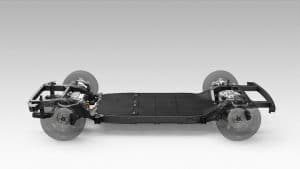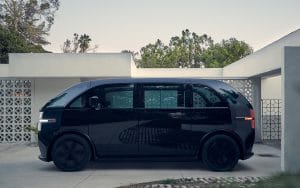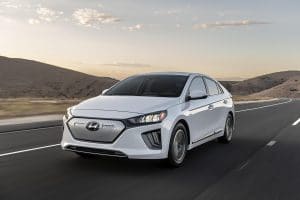Hyundai Motor’s efforts to accelerate and expand its electric vehicle development progressed Tuesday through its new partnership with California-based specialty EV maker Canoo.
The plan calls for Hyundai – and sister maker Kia – to use Canoo’s newly developed skateboard platform as the basis for a smaller electric vehicle similar in size to the Accent, Hyundai’s compact sedan. Canoo uses it for a vehicle it leases on a subscription basis.
It is the second deal in the last month that Hyundai has completed to grow its EV presence around the world. Last month, the company invested $110 million in UK startup maker Arrival to develop battery-electric commercial vehicles.
(Hyundai’s $52B “Strategy 2025” plan calls for battery cars and “personal air vehicles.”)
Using the skateboard as the basis for a compact-sized EV helps Hyundai save money on development costs due to the reduced time required to do the engineering. The goal, according to Canoo, is to pass those cost savings on to the end consumer.
Hyundai Motor Group also expects to reduce complexity of its EV assembly line, allowing for rapid response to changing market demands and customer preferences.
“We were highly impressed by the speed and efficiency in which Canoo developed their innovative EV architecture, making them the perfect engineering partner for us as we transition to become a frontrunner in the future mobility industry,” said Albert Biermann, head of Research & Development, Hyundai Motor Group.
(Hyundai Partnering with Aptiv — Targeting “Production-Ready” Robocabs by 2022.)
“We will collaborate with Canoo engineers to develop a cost-effective Hyundai platform concept that is autonomous ready and suitable for mass adoption.”
Hyundai recently unveiled plans to transform itself into a “smart mobility solution provider” by 2025, and it is committing $52 billion to get there. The “Strategy 2025” program will see a significant amount of that money invested in electrifying its line-up – a move that includes both battery and fuel-cell vehicles.
But the Korean carmaker also plans to focus on other alternative mobility programs that include the introduction of “personal air vehicles,” a more sophisticated term for flying cars. In fact, it revealed a flying car it created in partnership with ride-hailing giant Uber at CES last month.
(Canoo debuts 1st production EV – but only plans to offer it by subscription.)
Hyundai has been investing heavily in recent months in a variety of future transportation ventures, including a $4 billion joint venture with auto supplier Aptiv. The enterprise was announced in September and will work to develop self-driving vehicles and systems.




Call me stupid, but what’s all the mystery about developing a ‘skateboard’? I would guess Hyundai/Kia engineers could do the design over a long weekend; hell, there must be 15 start-ups that claim they invented the best thing since sliced bread. What people really care about is in the top hat (styling, ride dynamics, electronics, comfort, safety, …).
The mystery, Jim, is getting everything right. It’s more than just mounting batteries and motors but all the control technology and such. I recall driving a prototype one company was developing that crabbed, ever so slightly, as you went down the road. No matter what they did they couldn’t quite get the motors and other hardware to sync up. It’s a lot more complicated than you might suspect.
Paul E.